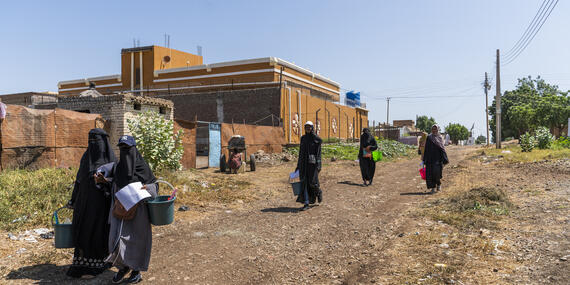UN relief chief warns global health is “under threat like never before”

Under-Secretary-General for Humanitarian Affairs and the Emergency Relief Coordinator Martin Griffiths’ remarks at the Launch of WHO’s Health Emergency Appeal 2024
As prepared for delivery
In December, I launched OCHA’s Global Humanitarian Overview for 2024, which set out our plans to meet the humanitarian needs of 181 million of the most in-need people in 72 countries this year.
Across many of these crises, conflict, climate change, disease and economic instability are interacting to create deep and increasingly complex health emergencies.
In Sudan, for instance, the conflict that erupted last year stretched the health system far beyond its capacity, and left it unable to provide the everyday care that people need, let alone adequate medical attention to civilians injured in the fighting. Weak disease surveillance and low vaccine coverage for preventable diseases have contributed to recurrent measles outbreaks.
So too in Haiti, Somalia, Yemen and many other countries are infectious diseases being driven by, and exacerbating, broader humanitarian crises. At least 29 countries are reporting outbreaks of cholera, including in countries that have not reported the disease for many years. One billion people are at risk.
As the climate crisis continues to deepen, so do the associated health risks of malnutrition, malaria, diarrhoea and heat stress. Direct costs to health care from climate change are expected to be between US$2 billion and $4 billion per year by 2030.
And global health is under threat like never before. In 2023, 1,300 attacks on health care across 19 countries led to more than 700 deaths and 1,100 injuries to health workers and patients, deeply impacting the ability to address heightened health needs in crises.
In the Occupied Palestinian territory alone, more than 624 attacks on health care have resulted in the deaths of 619 health workers and patients and injury of 826 others, as of 11 January 2024, since 7 October. You will shortly hear from my colleague [Humanitarian Coordinator for Ukraine] Denise Brown about the impact of the war in Ukraine on health.
Just as the issue of health is at the very heart of so many crises, so, therefore is the role of the WHO [World Health Organization].
On the ground in more than 150 countries, working with 900 international, regional and local health cluster partners to deliver vital health assistance, WHO offers the unique expertise and capacity to save lives.
And they have more than shown their ability to do so. In 2023, they led the health cluster in meeting the health needs of 102 million people across 29 countries. They supported more than 44 million primary health care consultations, deployed more than 8,000 mobile clinics, and helped distribute 30 million oral cholera vaccine doses.
The WHO’s role in the coming year will be no less important.
This is why I fully endorse WHO’s Health Emergency Appeal for 2024 and call for donors to provide the funding the WHO needs to do such vital work. It is small price to pay to protect the health of the most vulnerable and prevent the deepening of a global health crisis.
